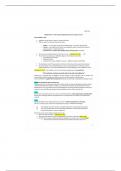Lecture notes
Oxford law Contents of Contracts Notes
- Module
- Contract Law
- Institution
- University Of Oxford
This document contains revision notes for contents of the contract and implied terms, which is a highly examinable area both in relation to essays and problem questions. Essential!! To your success in academics!! Enjoy!!
[Show more]



